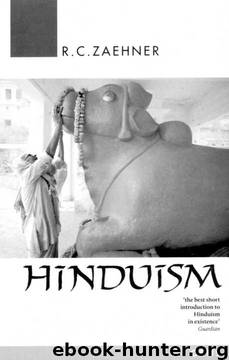Hinduism by Robert Charles Zaehner

Author:Robert Charles Zaehner
Language: eng
Format: epub
Published: 2009-11-30T01:33:00+00:00
5
Dharma
BETTER TO DO ONE'S Own duty (dharma) though void of merit than to do another's duty, however well performed. Doing the works (karma) that inhere in one's own condition (svabhava-niyata) one remains unsullied. One should not lay aside the works that are inborn in each of us, even though they involve demerit (sadosha), for all enterprises are associated with demerit as is fire with smoke (BG, 18.47-48).
Karma, though it must be transcended by a total detachment from its `fruits', is, nevertheless, inherent in the very nature of things: sannyasa ('renunciation' or `abandonment') does not necessarily mean opting out of the world in fervid, selfless, and yet selfish asceticism, but rather living in this world in the sublime consciousness of not being of this world. Though the soul be not yet free (mukta, `liberated'), it should behave in the body as if it were free and cultivate the virtues of dispassion that are natural to the liberated man. In this a man would simply be doing what God does, for Krishna says in the Giza:
I need do nothing at all in the three worlds, nor is there any goal that I have not attained, and yet I am engaged in the doing of works (karma). For were I not to engage in works tirelessly, all men would follow my example, and these worlds would fall into ruin were I not to perform works. Then would I be a worker of confusion and a destroyer of these [my] creatures (BG, 3.22-24). The system of the four great classes was generated by me together with the virtues (guna) and works attached to each. Worker of all this though I be, know that in eternity I do no work at all. Works do not defile me nor have I any desire for their fruits. He who knows that such is my nature, is not bound by [any] work [he may perform]. You must know that works were performed even by the ancients engaged though they were in the quest for liberation. So do you too perform works even as did the ancients in time long past.... You must see inaction in [the context of] work and (action and) work in [the context of] inaction. The man who does this is wise, integrated, the worker of all works (BG, 4.13-18).
God originates and sustains the world and reabsorbs it into himself: this is his karma (work) and his dharma. And man who, according to the Gita, is a particle of God, must imitate him in his activity as well as in his eternal rest. To opt out of the active life and to sink oneself into the timeless peace of Brahman is to `become Brahman' and thus to become like God who is the origin of Brahman, but it is to become like God in only half his being: it is a refusal to become a perfect image of God in his totality. Nor should it be supposed that God has no purpose in what he
Download
This site does not store any files on its server. We only index and link to content provided by other sites. Please contact the content providers to delete copyright contents if any and email us, we'll remove relevant links or contents immediately.
| Chakras | Gandhi |
| History | Rituals & Practice |
| Sacred Writings | Sutras |
| Theology |
Fingersmith by Sarah Waters(2006)
Kundalini by Gopi Krishna(1822)
The Bhagavad Gita by Bibek Debroy(1665)
Indian Mythology by Devdutt Pattanaik(1619)
Wheels of Life by Anodea Judith(1604)
The Yoga of Jesus: Understanding the Hidden Teachings of the Gospels by Paramahansa Yogananda(1522)
The Man from the Egg by Sudha Murty(1499)
Autobiography of a Yogi (Complete Edition) by Yogananda Paramahansa(1485)
Chakra Mantra Magick by Kadmon Baal(1382)
The Book of Secrets: 112 Meditations to Discover the Mystery Within by Osho(1349)
Avatar of Night by Tal Brooke(1256)
The Sparsholt Affair by Alan Hollinghurst(1242)
Sparks of Divinity by B. K. S. Iyengar(1226)
Karma-Yoga and Bhakti-Yoga by Swami Vivekananda(1217)
The Bhagavad Gita (Classics of Indian Spirituality) by Eknath Easwaran(1205)
Gandhi by Ramachandra Guha(1192)
The Spiritual Teaching of Ramana Maharshi by Ramana Maharshi(1171)
Skanda Purana (Great Epics of India: Puranas Book 13) by Bibek Debroy & Dipavali Debroy(1137)
Hinduism: A Very Short Introduction (Very Short Introductions) by Knott Kim(1115)
